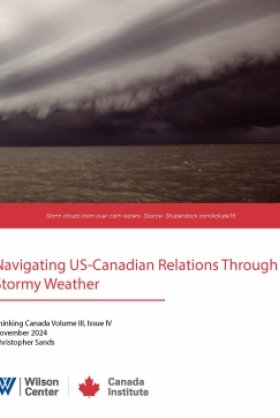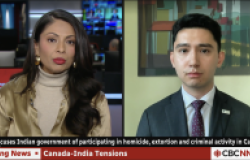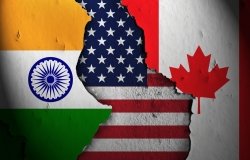Statement From Former Canadian, Mexican, and U.S. Ambassadors at Convocation 4.0
On December 3, 2024, we gathered in Washington, D.C., to participate in the fourth edition of the Convocation Program, an initiative led by the U.S.-Mexico Foundation and the Woodrow Wilson Center’s Mexico Institute. The program brings together former American, Mexican, and Canadian Ambassadors to Mexico, Canada, and the United States.
From the outset, Convocation has served as a space for candid and informal discussions on North American relations and offered the general public reports with our shared views, concerns, perspectives, and proposals on key topics essential for long-term regional prosperity and security. Our discussions are also informed by the participation of field experts in topics such as trade, supply chain integration, migration and labor mobility, security, and public diplomacy.
As part of our discussions in Washington, D.C., and in the context of the upcoming review of the United States, Mexico, and Canada Agreement (USMCA), we concluded that a trilateral agreement constitutes the backbone of North American economic relations and remains a critical element of regional prosperity. It was also noted that by strengthening the trilateral agreement, we can improve the integration and resilience of regional essential and national security supply chains and foster a safe economic region. We agreed that, ultimately, improving our supply chain integration is necessary for regional competitiveness vis-à-vis China and for ensuring shared prosperity and well-being.
On migration and labor mobility, and given current hemispheric and extra-hemispheric trends regarding the movement of people, we emphasized the need for more humane, efficient, safe, legal, and orderly immigration policies to tackle labor shortages and foster cooperative actions to address irregular migration, including collaboration with the countries of origin. We also discussed the urgent need for legal pathways to manage migration and capitalize on its economic benefits. Confronting human smuggling and trafficking groups needs to be prioritized.
Regarding security, we concur that increased cooperation has to be an integral component of North American relations and that improved institutional collaboration under the principle of shared responsibility is needed to effectively combat transnational criminal organizations and in particular, the unprecedented threat posed by fentanyl. We further noted that significantly better coordination among agencies at all levels is necessary to effectively address the threats posed by transnational organized crime throughout the region, by the challenges regarding cybersecurity, and the role of extra-hemispheric actors. By cooperating holistically, we can foster and deepen mutual trust. We are convinced that in the face of transnational threats, we urgently require transnational solutions.
Additionally, we agreed on the need to increase international educational exchanges and North American trusted traveler programs and promote tourism and culture as tools to foster human connections and reciprocal understanding. In this regard, we agreed that the FIFA World Cup 2026, jointly hosted by the three North American countries and expected to be the largest in history, will serve as a powerful platform to promote understanding and close ties within the region, elevating its prominence on the global stage.
In sum, we consider that a unique set of domestic, regional, and global factors is present to shape the future of North American relations. To move forward, we need to strengthen trilateral cooperation, not weaken it. This cooperation is essential for effectively addressing migration flows, enhancing trade, improving security, and fostering shared prosperity. In today’s uncertain global landscape, North America is called on to become the world’s most competitive and secure region, and we cannot afford to pass up this opportunity.
The U.S.-Mexico Foundation and Woodrow Wilson Center will issue a full report detailing each session, findings, and recommendations.
Pierre Alarie
Louise Blais
Miguel Basáñez Ebergenyi
Jeffrey Davidow
Carlos de Icaza González
Gerónimo Gutiérrez Fernández
Michael Kergin
Eduardo Medina Mora
Dionisio Pérez Jácome
Arturo Sarukhán Casamitjana
Francisco Suárez Dávila
Anthony Wayne
Related Program

Mexico Institute
The Mexico Institute seeks to improve understanding, communication, and cooperation between Mexico and the United States by promoting original research, encouraging public discussion, and proposing policy options for enhancing the bilateral relationship. A binational Advisory Board, chaired by Luis Téllez and Earl Anthony Wayne, oversees the work of the Mexico Institute. Read more











